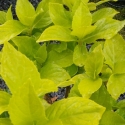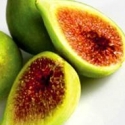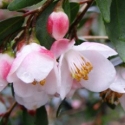Our weekly email news letter. Sign up here to get them delivered straight to your email in box. See below for previous issues...
Please note that product availability and prices may have changed from when this newsletter was sent. Please check this site or phone us for current availability and pricing.
Saturday 4th April, 2020
Hi
Just the time for a new hobby!
Sometimes it can be, shall we say a mind stretching exercise, to write a newsletter each week... especially currently when there are no new, exciting plants arriving to rev up my enthusiasm to send to you through my writing. But I received so many wonderful emails last week, with such kind messages, that I just want to send a big thank you to you all. I was especially excited to have one from Ian and Helen, my first employers, teachers and mentors... who inspired me in all things horticultural. I feel it's important to keep connected with you all as it gives a sense of purpose while we have to patiently await the day that some sort of normality comes around again. I have to say that it's pretty weird working away in the garden centre with no customers, phones or workmates and we are only ever shut a couple of days, at most, in the year so the silence here is huge.
I was thinking that if you now have your garden all sorted and those new beds organised for planting, once shopping is a thing again, and are now looking for a little project or two how bout doing a little reproducing... of the plant kind... making some of your own cuttings could be fun and lead to a new hobby.
It's all in the wood (stems or branches) that you have available to use. Hard wood is just that, mature, hard wood with woody tissues inside and has usually changed colour from young green to mature brown stems that have lost their leaves for the year or are about to do so. Hard wood cutting are usually pretty easy to strike. Hydrangeas, grapes, figs and roses are all plants that spring to mind that would be good to grow as hard wood cuttings. Rose growers take hardwood cutting of rose rootstocks and basically use the same method. Now they do get a tad more fancy and put the hard wood cuttings on what they call bottom heat to get the cells dividing and forming callus tissue from which the roots grow. Bottom heat is a fancy bed to sit the cuttings on... a bit like underfloor heating that houses have, they possibly could get away without the bottom heat but the strike rate will be higher if they do this process.
Tony used this hardwood cutting technique on a special hydrangea that we had in the garden. Borer and old age had had their way with it, it was on it's last legs and I was not sure if anyone was growing hydrangea villosa again, so we made some hard wood cuttings of it and pushed two thirds of the stem into a space in the vege garden... they have grown and this winter, we will lift them and move them to a proper position in the garden. You could do the same with a fav rose or to save a plant, a great way to take some old favs with you if you are moving house. A slightly shaded space in the vege garden could be the place or I know that many grow hydrangea cuttings in situ.
Preparation is pretty simple and usually involves cutting a stem or cane of a reasonable length, usually 30 to 50 cm and push two thirds of the stem into the ground. Autumn through winter is the best time to take hardwood cuttings as the ground is usually moist without being wet.
Semi hardwood is just as the name suggests and you have to do the finger test to see if the wood is good to go. Semi hardwood growth is not the soft stuff at the ends of the plant and not the hard changed coloured stuff, but rather stems that are firm to touch. Many, many plants can be grown from semi hardwood cuttings. Often perennials, but even hydrangeas and roses. Cuttings are usually done with a knife, but could equally be done with sharp scissor or even secateurs. Once made, dip the rooting end into some rooting hormone which will help encourage cell activity, which in turn will hopefully grow roots. Insert the cuttings into trays of some growing media. The media needs to suit the conditions that you are trying to strike the cuttings in.
The media needs to stay moist but not wet or dry. Now growers will insert cuttings in trays of pumice or sand, usually strike these in a tunnel house on bottom heat. Really sophisticated places will even have a misting system to keep the cuttings turgid and as they are constantly wetting the cutting, the media used needs to free drain. To apply this at home... if you are not misting or regularly watering then you may need to add some peat to hold some water.
Semi hardwood cuttings are usually cut to lengths of around 10 to 15 cm in length and are mostly nodal, ie cut below a leaf bud and above a leaf bud. Many plants will be pieces of the stem of approx 3 to 5 buds with top leaf often left but some of the leaf is partially removed to lessen water loss. Some humidity is then required to keep the cutting from collapsing.
It's all a balancing act and you will have to adapt, whether you have a mini green house or you are going to create one, from say a soft drink bottle cut in half with the top reversed, but in very simple terms you need to keep the cutting from collapsing and in good condition until roots grow.
Just about all plants potentially can be produced by semi hard wood cuttings but the skill is knowing the variables and manipulating them. Knowing when the cutting wood is just right and different plants will have different time of year that suit taking the cuttings. Camellias for example may be when the spring growth has hardened (firmed off) but some cultivars may suit after the Autumn flush has hardened. I remember doing Cupressus, Buxus and Euoynmus cuttings from tips or pieces of stems that were firm and inserting into covered cold frames with beds of sand through the winter with the odd watering to keep the frames moist... Bottom heat can speed up the process.
Just remember that patience is a virtue and the skill that propagators have is earned by years of experience and record keeping. Cupressus and Buxus cuttings may take 6 months to grow some roots. This of course will vary from plant to plant depending on species. Perennials in general will be much quicker.
Once a plant has some roots its best to lift gently from the media and pot into some small pots with potting mix for the root mass to establish. Usually again another 6 to 9 months and then pot again or plant out into the garden.
Don't forget there are many ways to produce plants from divisions, seeds and grafting. Sowing seed and doing some divisions could also be fun and keep you out in the garden.
I'm know that if you search there will be an abundance of information out there... but if you get a bit serious you may want a greenhouse ...know that one of my team has just completed building their own little green house and a friend has been very clever building a glass house out of recycled windows... Hmm... I'm thinking that I might have green house envy and need one myself so I can collect and grow obscure Species Camellias!
We are still taking orders for current stock and I see that many have been shopping, of course I'm not sure when we can dispatch these but know that we are putting them aside for the day that we can.
New seasons stock is also online and there to browse through and make any orders. No payment required but does get the stock allocated to you if available. There will be approximate delivery dates but these are now subject to the lockdown being lifted. Check out roses for June, Camellias for April/May, Citrus April/May/June, ornamental and fruit trees usually July. Have fun browsing but keep in mind that if ordering plants due in later months then we cant hold plants available in April/May until June/July ones arrive as it is not feasible.
Another day in paradise and I'm off to work to do some potting, check the watering and the usual visual look round to make sure that all is well. I want to be sure that when we are out of alert 4 that the garden centre still looks fab. There is always an up and my bubble has plenty to keep me active and I'm sure that all our fellow gardeners can find something to do as gardening is never finished
Take care, stay safe, stay at home
Lloyd, Tony and the Wairere team.
Archived by year 2022 | 2021 | 2020 | 2019 | 2018 | 2017 | 2016 | 2015 | 2014 | 2013 | 2012 | 2011 | 2010 |
2020 Newsletters...
Fabulous Febuary (21st February, 2020)
Watering Woes (28th February, 2020)
Orchard or Orchard (6th March, 2020)
Autumn sale time (13th March, 2020)
New Season's Camellias (20th March, 2020)
Vege Plants (27th March, 2020)
..... Something to try
Lockdown dinner for my bubble (12th April, 2020)
Feijoas in abundance 1 (18th April, 2020)
Alert level 3 (25th April, 2020)
Drive through (9th May, 2020)
New Rules (15th May, 2020)
Impending roses (29th May, 2020)
Impending roses (29th May, 2020)
winter programme (6th June, 2020)
almost done (20th June, 2020)
Pruning Tech (3rd July, 2020)
In the Clouds (10th July, 2020)
Crystal ball and mags (24th July, 2020)
Chicken curry (14th August, 2020)
Big is Best (21st August, 2020)
Mouse tail plants coming (28th August, 2020)
Fluff n pretties (4th September, 2020)
Hybrid Clematis take 2 (18th September, 2020)
Those dry Places (25th September, 2020)
Water gardens (2nd October, 2020)
Balloon over Wairere (10th October, 2020)
Chilly Thursday 15/10 (16th October, 2020)
Spring has sprung (23rd October, 2020)
Kumara time (31st October, 2020)
Awesome Rain (12th November, 2020)
A pink selection of roses (16th November, 2020)
Hibiscus (22nd November, 2020)
Unexpected fruit (28th November, 2020)
Its time (5th December, 2020)
Hostas Again (12th December, 2020)
Its a wrap (19th December, 2020)
HL Nurseries Limited t/a Wairere Nursery
826 Gordonton Road, R D 1, Hamilton 3281 Ph: (07) 824 3430 Email:















